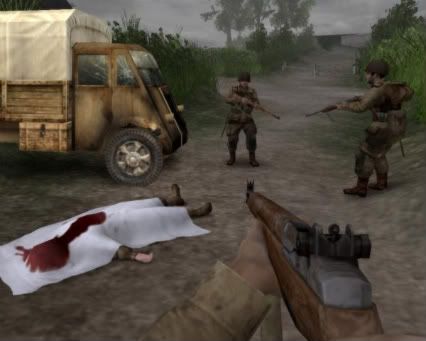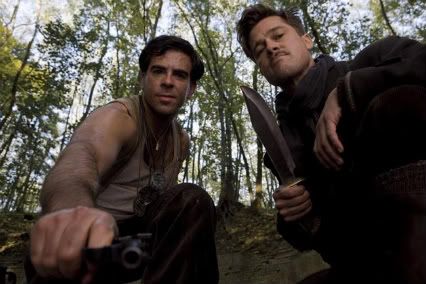
There have been so many videogames set during the second world war, it’s quite likely that you’ve played at least one or two. Thanks to the painstaking attention to detail and hunger for historical accuracy, you may even have learned something new about the conflict without realising; the weapons used, the important battles fought, the dates of important events. Be thankful that our children do not rely solely on videogames for their education on such matters for if they did, they would be completely unaware of the Holocaust.
Approximately six million men, women and children were murdered – often literally worked to death – simply because they were Jewish. Millions more were persecuted and killed by the Nazis including (though not limited to) homosexuals, Romani, people of various faiths, and the disabled. A horrific systematic slaughter on an unimaginable scale, it was arguably the most important event of the twentieth century in terms of influence on social and political development. The word ‘genocide’ was not even in use until 1944 (though its author first coined the word in 1943), when the Polish-Jewish legal scholar Raphael Lemkin named and defined it (“the destruction of a nation or of an ethnic group”) in his published work ‘Axis Rule in Occupied Europe’. The human race being what it is, genocide has been perpetrated time and again in places such as Bosnia and Darfur; but the horror of the Holocaust has served to increase worldwide disgust at, and determination to punish and prevent, such actions further than ever.
Though the full extent of Nazi persecution of the Jews was not made clear until the end of hostilities, more than enough was known about this (in addition to Hitler’s megalomania, of course) during the war to mark the fascist Nazi party out as a force that must be stopped at all costs. With the benefit of hindsight, the people of today are able to pore over every last detail, which makes the second world war that rarest of things in our eyes – an undeniably necessary conflict.
So why do few – if any – videogames set during this war mention or in some way refer to the Holocaust?
It’s easy to turn to dark and overly cynical theories, but the truth is most likely that developers are simply scared. They won’t go anywhere near the subject for fear of causing offence, knowing full well that just one mistake could trigger a global outrage. If this is the case, then it’s definitely an attitude I can understand and sympathise with – but not one that I can condone.

Even the surprisingly thoughtful Brothers in Arms games avoid the subject.
I haven’t played every single videogame set during the second world war, so there are perhaps a few that explicitly refer to the Holocaust. If so, they are undeniably in the minority. It should be noted however that there was one game which aimed to tackle the issue head on in an educational, tasteful way – and got shot down in flames before securing a release.
The title I am referring to is ‘Imagination Is The Only Escape’, a DS game that British developer Luc Bernard had developed and was hoping to have hit the shelves. The game was to combine a game world based on the fantasy world of the main character (a Jewish boy living in Nazi occupied France) with educational, historically accurate text. However, it seems that both Nintendo of America and Nintendo of Europe refused to allow the game a release – without even seeing it. Despite scouring the internet I was unable to find any information on this title dated after late 2008, so it seems that it will never see the light of day.
What little was known of this game was intriguing, and it seems to be a real shame that Nintendo killed it off. The false start of Bernard’s title is no excuse for others however, as (a) WWII games were being developed long before 2008, and (b) in all honesty, it would have been more surprising if the family oriented Nintendo did approve a game that directly addresses the Holocaust, especially one for the DS.
If you think that games are art – and if you’re a developer, you probably do – then you shouldn’t for a second be thinking ‘games should stay away from the issue of the Holocaust’. I’m not saying that there should be a game about the Holocaust (though I believe this is possible), but the world of videogames has a duty to at least recognise the fact it happened. There are countless examples of other forms of entertainment handling the subject. For example, the story of Oskar Schindler – the German industrialist who went to great pains to protect his Jewish workers, who numbered well over 1,000 – has been adapted into a novel (Schindler’s Ark) and a film (Schindler’s List). Staying with cinema, we should look to a more recent release for a glimpse of how a videogame acknowledging the issue could successfully be made.
Quentin Tarantino’s ‘Inglourious Basterds’ does not deal directly with the Holocaust itself. The beating heart of the film is Nazi persecution of the Jews however, which drives every moment of the movie. The rage and lust for revenge which fuels the Basterds leads them to kill and torture with gusto, visibly enjoying every moment. In fact, as the film progresses, the viewer may well start to question just how much higher on the moral ground the Basterds are than the Nazis whom they hunt.

As anybody who has seen the film will know, this shot captures perfectly what Inglourious Basterds is all about.
During one brilliant and extremely tense sequence, we are teased with finding out whether or not the leader of the Basterds will keep his word and show mercy to a young, solitary Nazi soldier. When the moment of truth arrives… well, you’ll have to watch the movie to find out.
The point is this: Inglourious Basterds is identifiably a Tarantino movie, and one that you can ‘enjoy’. There are traditional action sequences, and a dark humour runs throughout the entire experience. This is all wrapped up in stylish direction and glossy production values. Does this sound a million miles away from the basic premise of several action games released over the last few years? All that’s missing is one thing; the skilful integration of Nazi persecution of the Jews.
There is of course one very important factor which distinguishes videogames from books, movies, plays etc. which I have yet to acknowledge – interactivity. Yet this is a strength to be played to, not a weakness to fall back on. Games including (though certainly not limited to) Bioshock, Okami, Flower and GTA have shown us very different ways in which videogames can offer a compelling, utterly unique experience. Why not use this vision and skill to handle a serious and important subject that must never, ever be forgotten?
I was going to detail The Milgram experiment here, but instead urge you to investigate the matter yourself. Please do – it is fascinating, and disturbing, in and of itself. You will see why I encourage you to research it in relation to this article.
How best to introduce the Holocaust and/or Nazi persecution of the Jews into the world of videogames? Unfortunately for me, I have neither the skill set nor the experience of a videogame developer. If pushed however I (and many others) could easily come up with rough ideas for those who do. What might they achieve on their own, if only they would try?
I believe that videogames not only could, but should make a concerted effort to look this subject straight in the eyes. There is no precedent – but just because something has not been done before, that is not to say that it can not be done at all.


At the very least when playing a war game, the fact the holocaust is take place ‘eslwhere’ could be mentioned. Or perhaps at the end of a level the soldier arrives at a concentration camp which has just been liberated. It could be made a cinematic with NO interaction, just to reinforce the context around the battle you as the player just journeyed through.
Holocaust aside, games dealing with war hardly touch the issues of refugees either. The roads are normally clear of civilian traffic etc. Perhaps games could start to put players into difficult situations. MW2 tried the airport scene, but since then we see no one else stepping up.
Imagine a FPS where you fight insurgents but you cannot tell the difference between combatants and civilians. It would be quite a challenge and potentially unsettling. Maybe it is the case that, even for war games, they need to be “fun”.
Have you heard of Brenda Brathwaite’s Train? Here’s a link, apologies for linking to another video game site, but it is a good article.
http://www.gamestm.co.uk/discuss/brenda-brathwaites-train/